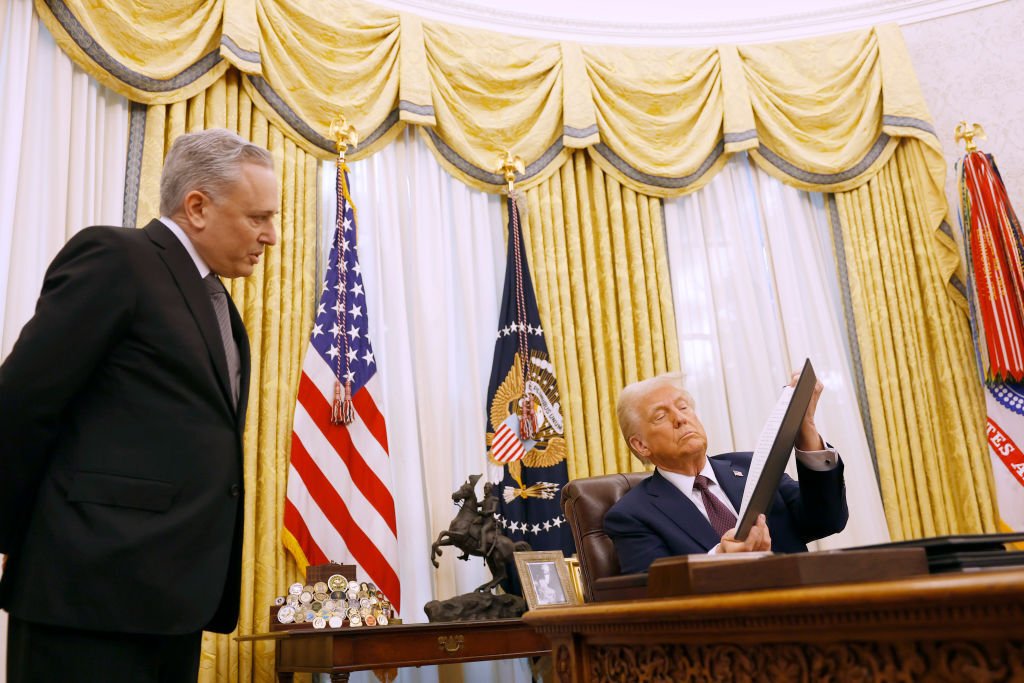Trump’s AI and Crypto Plans Unveiled
On January 23, 2025, in the Oval Office, President Donald Trump signed a series of executive orders aimed at boosting the development and application of artificial intelligence (AI) and addressing cryptocurrency issues. David Sachs, appointed as the “AI and Crypto Czar,” was present during this signing.
The administration’s objective is to significantly enhance AI capabilities while also rolling back certain environmental rules. There seems to be a strong focus on constructing energy-intensive data centers, which raises some concerns about their environmental impact.
The new strategy, titled the “American AI Action Plan,” was made public following a six-month study led by a technology adviser. This initiative encourages a careful yet aggressive approach to AI safeguards and aims to increase AI usage among American workers in their everyday activities.
David Sachs remarked, “To win the AI race, the US must lead in innovation and build global partnerships. It’s essential to prioritize American workers and avoid surveillance-style AI.” The action plan outlines three primary areas: expediting AI innovation, enhancing American AI infrastructure, and securing an international stance on AI diplomacy and security.
To realize these ambitions, the administration suggests eliminating certain restrictive AI regulations. They have directed the Department of Science and Technology Policy to assess federal rules that may hinder innovation, hinting that funding may be cut for states with burdensome AI rules.
Interestingly, despite challenges faced by Congressional Republicans, the plan acknowledges that states still should have the ability to pass AI legislation without excessive limitations. There’s a strong emphasis on upholding free speech rights in AI development, aiming to ensure that AI models focus on truthfulness while combating misinformation.
The administration also sees extensive deployment of AI across various sectors, including government, manufacturing, and the Department of Defense. This involves an increase in funding and permits for testing AI technologies. The proposed reforms aim to simplify the process of constructing data centers, which includes relaxing some environmental regulations.
There’s a cautionary note regarding cybersecurity risks, emphasizing that a robust national security strategy is necessary for safe AI development. Collaborating with other nations working towards beneficial AI models is encouraged, but the plan also states a commitment to countering China’s influence in this area.
Secretary of State and National Security Advisor Marco Rubio highlighted that clear policy goals are essential for ensuring U.S. tech leadership globally. The outlined objectives resonate with the deregulation stance Trump took during his campaign, bolstered by support from major technology firms.
During the “AI Race Winning” summit on the same day, Trump advocated for a unified federal AI standard rather than a fragmented state-by-state approach. He stated, “Three or four states can’t hold you back. We require federal regulations.”
Hosted by the Hill & Valley Forum, the summit allowed discussions on the Action Plans. Trump also mentioned the swift approval of data center permits and plans to eliminate AI systems with ideological biases when federal purchases are made.
Trump expressed the need for the U.S. to maintain a leading position in the global AI competition, while acknowledging the dual nature of technology—its potential for both positive and negative impacts. He believes the U.S. is on the verge of a “golden age” driven by American innovation.
In his speech, Trump emphasized the importance of American energy and technology in fostering prosperity, noting how enhanced AI could make the country more competitive. He touched on improving relationships with tech giants such as Amazon and Google, urging them to invest significantly in data centers this year.
He admitted, “I wasn’t a huge fan of them initially, but I learned a lot and grew fond of what they do.” His connection with tech leaders seems to be evolving positively, aligning with the proposed policies.
Sam Altman, CEO of OpenAI, also weighed in on the ongoing AI evolution. He expressed amazement at AI’s rapid growth over the last five years, emphasizing its substantial potential for productivity and innovation. However, Altman noted the genuine risks associated with AI, including emotional dependencies and international threats.
“If there are no malicious intentions, society is heading in an unusual direction,” he cautioned.







